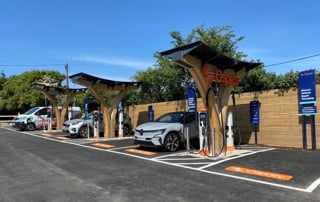PwC Strategy&’s Powering Ahead report, written in conjunction with Energy UK, suggests the UK electric vehicle market is now at a tipping point.
If the UK is to become a leader in electric vehicles and low carbon transport, access to a range of convenient charging solutions will be critical, the report suggests.
Consumer demand for electric vehicles (EVs) is growing rapidly and there are a few large incumbents providing charging infrastructure services and many new smaller entrants.
Steve Jennings, UK leader of Energy and Utilities at PwC, said: “The UK EV charging market is arguably one of the most advanced in Europe. We have one of the largest EV stocks of any EU country with a large conventional car fleet. We also rank alongside Germany when it comes to the number of publicly accessible fast chargers – an indicator of the UK’s efforts to provide the best service to consumers.
“Therefore, it is essential we retain the momentum of success. We need to nurture the commercial environment that allows multiple business models to flourish and provide a diversity of charging options for customers.”
The sector is already showing early signs of consolidation with BP’s acquisition of Chargemaster earlier this year.
PwC surveyed some of the leading operators in the electric vehicle charging industry alongside interviews with other key stakeholders including transmission companies, electricity suppliers and distribution businesses.
Breakdowns show EV stock has grown by a compound annual growth rate (CAGR) of 89% between 2011 and 2017, virtually doubling year-on-year.
Plug-in hybrid electric vehicles (PHEVs) have driven the bulk of that growth compared to a far smaller number of pure battery electric vehicles (BEVs), the report finds.
But infrastructure is struggling to keep up, growing at half the rate of electric vehicle stock.
The deployment of charge points to date has been strongest across Greater London (22%), Scotland (15%) and the South East (14%), accounting for more than half of all UK EV points.
Generally, a supportive regulatory environment and growth in demand for charging infrastructure has attracted many companies into the space. PwC’s experts have identified at least 60 charge point operators (CPOs) or hardware players in the UK, ranging from electrical conglomerates through to data-focused start-ups.
However, with demand likely to pick up as the deadline for phasing out diesel and electric vehicles draws closer, CPOs - especially those looking to capitalise on the home charging sector - will have to balance providing more charging points against the installation costs.
Adrian Del Maestro, director of research at PwC Strategy, said: “Home charging will be a relatively easy segment for charge point operators to develop as EV demand grows. According to our research, the majority of homeowners (78%) have access to off-street parking, so charging at home is straightforward. Moreover, investment costs and regulatory complexity are relatively low, compared to rapid charging – but there is still a long way to go.
“There is still a sizeable proportion of people without access to home charging, so alternative models, from rapid to street lamp charging solutions will need to evolve to meet this demand if the UK is to realise its ambitions as a leader in low carbon transport.
“Currently it costs about £1000 to install a 7 kilowatt slow home charger socket, whereas a 50kW rapid charger is likely to cost upwards of £30,000 a connector."
PwC predicts that home charging will become ‘increasingly more convenient’, while destination charging will become more reliant on the level of footfall it can generate at locations such as supermarkets and leisure centres.
“While the economics of rapid charging are very different to other charging solutions such as home, it does offer consumers the potential to power up their vehicles very quickly and in a way that is similar to filling up traditional internal combustion engines (ICE) vehicles.
“Destination charging is gaining popularity, but in the longer term, figuring out the destinations of the future as shifts in leisure and shopping habits continue will be key to sustaining this segment. As for workplace charging there are clearly opportunities for scaling up and usage especially in terms of car fleets,” added Del Maestro.





















Login to comment
Comments
No comments have been made yet.